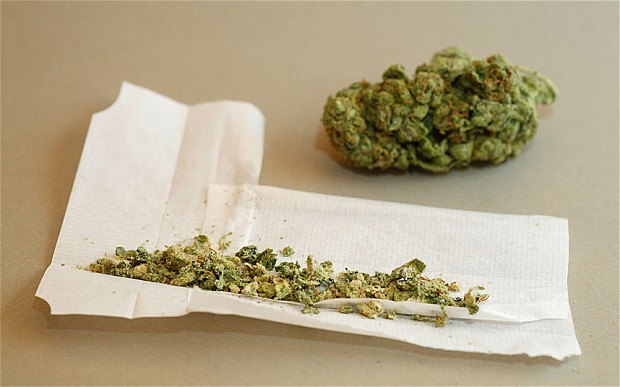Police force gives cannabis users green light to grow drugs
 Durham Police and Crime Commissioner Ron Hogg says the force will not proactively target small scale cannabis producers who are growing for their own use.
Durham Police and Crime Commissioner Ron Hogg says the force will not proactively target small scale cannabis producers who are growing for their own use.
A police force has given drug users the green light to grow cannabis at home after declaring that officers will no longer proactively target small scale producers.
In a move, which will be seen as a further step towards decriminalisation, Durham Police has said it will only go after people growing and using the drug if there is a complaint or if they are being “blatant”.
While the force has insisted it will continue to tackle large scale cannabis farms and other areas of criminality associated with the drug, those who grow and use the cannabis at home will not be actively pursued.
The move comes in the wake of comments by the force’s Chief Constable, Mike Barton, who has argued that investigating and prosecuting drug addicts is “waste of police time”.
Mr Barton has also called for the decriminalisation of hard drugs such as heroin and cocaine, arguing that if they were supplied on the NHS, addicts would not need to go out and commit crime in order to buy illegal narcotics.
The new approach to cannabis production came from the force’s Police and Crime Commissioner, Ron Hogg, who said that anyone caught in possession of the drug would be given the opportunity to avoid prosecution by signing up to a crime reduction initiative.
Cannabis users who have committed less than three crimes would be eligible for the programme and would only be prosecuted if they failed to comply.
Mr Hogg, a former policeman himself, told the Northern Echo: “Cannabis use is still illegal and smoking it is still a crime, but if you are caught, you will get this opportunity to stop reoffending.
“By and large we are saying it is not the top of our list to go out and try to pick up people smoking joints on street corners but if it’s blatant or we get complaints, officers will act.”
He added: “It’s about keeping people out of the criminal justice system and reducing costs, it’s about being more productive with the way we approach things. It’s also about seeking to prevent future use by keeping people out of prison.
“My position is clear – I support decriminalisation of users and support debate around the use of cannabis for medicinal purposes.
“What we’re trying to do now is push forward for national debate on drugs policy – it’s quite clear that what has been done for 40 years is not working and we need a different approach.”
However, Simon Stephens of North-East drugs charity Addiction said the move towards decriminalisation was irrelevant from a health perspective.
He said: “Cannabis is still implicated in psychosis and mental health problems so from our perspective, legal or illegal makes no difference – it can be detrimental to health just like alcohol.”
This article was originally written by Martin Evans for The Telegraph.





Pretty! This was an extremely wonderful article. Thank
you for supplying these details.
Simon Stephens of North-East drugs charity Addiction said the move towards decriminalisation was irrelevant from a health perspective.
He said: “Cannabis is still implicated in psychosis and mental health problems so from our perspective, legal or illegal makes no difference – it can be detrimental to health just like alcohol.”
I’d be interested to know what Simon’s background is and if he has any qualifications in substance use because it doesn’t look like it and the fact that he is allowed to speak on behalf of an “addiction” service in that context is quite worrying.
I think that should read Addaction, not Addiction. I would suggest that this is an attempt to support the organisations position that there are harms in all drugs, albeit of differing degrees. The issue of the connection between psychosis and cannabis is well trodden path, however, if there is no underlying mental health issue to begin with would we not see the 5 million or so cannabis users flooding our hospitals and community services?
When people buy alcohol, the label on the bottle states the strength i.e 8%
Modern Cannabis strains can be very strong but have no labelling.
I would be happy to walk into a chemist shop and buy my prefered strength of cannabis, legally, paying tax, having full consumer rights and having the knowlege that the chemist will act professionally.
I totally understand people who are against drugs and drug use and fully support their right not to take them.
As a man in his sixties, and a long time recreational drug user, I long ago figured out, that for the majority of (older) people who are against narcotics, the issue has never been about the dangers that drugs pose, but more an inbuilt hostility to youth culture.
The one thing that is becoming self evident, is that, as the pre-sixties generation die out, that we’re finally being allowed to have rational debate about drug prohibition. In other words, it all boils down to demography. It’s a shame that I’ve had to spend my entire adult life looking over my shoulder. Time for a change of course I think.
Regardless of any connection between cannabis and schizophrenia, or between drugs and mental health more broadly, decriminalisation is certainly important from a health perspective. Currently problematic users may be put off from seeking help, and additionally the amount of help available is woefully inadequate. Decriminalisation/legalisation won’t necessarily change the number of drug users drastically but it will bring them out from the edges of society and into a place where drug use is more accepted and more treatment is available.